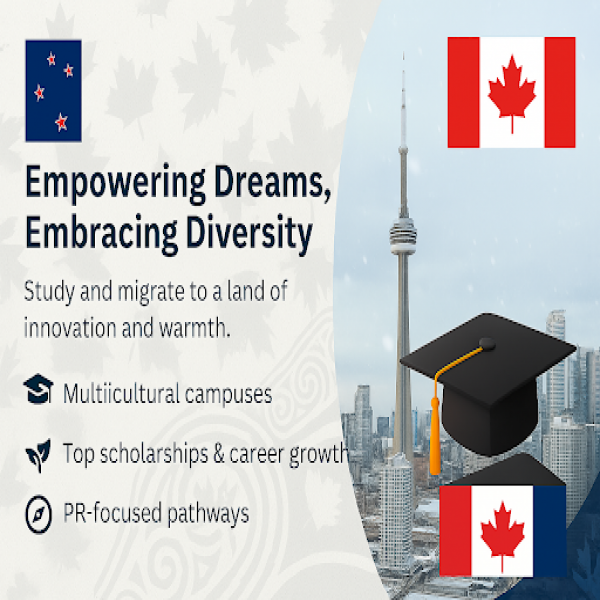Country We Serve Canada

Study in Canada – Overview
Canada is one of the most popular study destinations for international students due to its high academic standards, affordable education, multicultural society, and excellent quality of life. With globally recognized degrees and an open immigration policy, Canada welcomes thousands of students every year.
Canada offers a safe, stable, and inclusive environment, modern cities, and numerous job opportunities during and after studies. Many students choose Canada not only for education but also for the possibility of permanent residency after graduation.
Benefits of Studying in Canada
· - High-quality and globally recognized education
· - Affordable tuition fees compared to USA, UK, or Australia
·
- Post-graduation work permit (up to 3 years)
· - Pathway to Permanent Residency (PR) through Express Entry
· - Multicultural and inclusive society
· - Safe and peaceful country
· - High standard of living with modern infrastructure
· - Opportunity to work part-time during studies
· - English and French language learning opportunities
· - Access to top-ranking universities and colleges
Why Study in Canada?
International students choose Canada for several key reasons:
· - Government-funded healthcare in many provinces
· - High employability of Canadian graduates
· - Research-focused universities with modern technology
· - Part-time work options during studies (up to 20 hours/week)
· - Co-op programs that offer paid work placements
· - Wide variety of academic programs and certifications
· - Supportive immigration pathways to PR and citizenship
Education System in Canada
Canada’s education system is well-structured and falls under provincial jurisdiction. It includes public and private institutions offering high-quality academic and technical education.
Primary and Secondary Education
· - Primary School: Grades 1–6 (Ages 6–12)
· - Secondary School: Grades 7–12 (Ages 13–18)
Post-secondary Education
· - Colleges: Offer diplomas, certificates, and advanced diplomas with a focus on practical skills.
· - Universities: Offer undergraduate (bachelor’s), postgraduate (master’s), and doctoral (PhD) programs.
Types of Qualifications
Certificate: 8 months – 1 year (College)
Diploma: 2 – 3 years (College)
Advanced Diploma: 3 years (College)
Bachelor’s Degree: 3 – 4 years (University)
Postgraduate Certificate: 1 year (College/University)
Master’s Degree: 1 – 2 years (University)
PhD/Doctorate: 3 – 5 years (University)
Academic Year & Intakes
· - Primary Intakes: September (Fall) and January (Winter)
· - Secondary Intake: May (Summer – limited programs)
· - Most institutions follow a semester-based system
Student Visa Options
· - Study Permit: Required for programs longer than 6 months
· - Visitor Visa (Temporary Resident Visa - TRV): Issued for entry alongside the study permit
· - Spouse/Dependent Visa: Allows dependents to accompany and sometimes work (spouses may get Open Work Permit)
Visa is usually granted for the full duration of the course + 90 days.
Living Costs in Canada (Per Year)
Estimated annual cost for an international student: CAD $15,000 – $20,000
Sample Monthly Breakdown:
· - Accommodation: CAD $600 – $1,200
· - Food: CAD $250 – $400
· - Transportation: CAD $80 – $150
· - Internet & Phone: CAD $60 – $100
· - Health Insurance: CAD $600 – $900/year
Application Procedure
Required Documents:
· - Valid Passport
· - Academic Transcripts and Certificates
· - IELTS/TOEFL/PTE Score
· - Statement of Purpose (SOP)
· - Updated Resume (CV)
· - Letters of Recommendation (2)
· - Offer Letter / Letter of Acceptance from a Designated Learning Institution (DLI)
· - Tuition Fee Receipt
· - GIC (Guaranteed Investment Certificate) – CAD $10,000 (for SDS stream)
· - Medical and Police Clearance (if applicable)
Entry Requirements
Undergraduate Programs:
· - Minimum 12 years of education
· - IELTS 6.0 overall (no band less than 5.5)
Postgraduate Programs:
· - Recognized Bachelor's Degree
· - IELTS 6.5 overall (no band less than 6.0)
· - Work experience (for MBA or competitive programs)
Visa Process (Step-by-Step)
1. Choose a program and institution (must be DLI approved)
2. Apply and receive Letter of Acceptance
3. Pay tuition fee (partial or full depending on institution)
4. Purchase GIC (if applying under SDS)
5. Complete medical (if required)
6. Apply online for Study Permit via IRCC website
7. Submit biometric data (if requested)
8. Receive approval and get your visa stamped
Financial Requirements
Under SDS (Student Direct Stream):
· - Pay first-year tuition fee
· - Purchase CAD $10,000 GIC
· - IELTS 6.0 in each band
· - Fast processing time (4–6 weeks)
Non-SDS:
· - Show detailed proof of funds for tuition + living
· - Longer processing time (8–12 weeks)
· - Other English test scores accepted
Post-Study Work Rights
Students who complete a full-time program of 8 months or more at a DLI are eligible for a Post-Graduation Work Permit (PGWP):
Less than 8 months: Not eligible
8 months – 2 years: Same as course duration
2 years or more: Up to 3 years
Job Opportunities
Part-Time Jobs During Study:
· - 20 hours/week during academic sessions
· - Full-time during scheduled holidays
· - Average wage: CAD $15 – $20/hour
Co-op / Internship:
· - Paid internships through college/university placement programs
· - Co-op jobs are relevant to field of study
After Graduation:
· - Full-time skilled employment in Canada
· - PGWP provides a pathway to gain work experience for PR
Pathway to Permanent Residency (PR)
Graduates can apply under:
· - Canadian Experience Class (CEC)
· - Provincial Nominee Program (PNP)
· - Federal Skilled Worker Program (FSWP)
Having Canadian education and work experience significantly increases your CRS score in Express Entry.
Canada is Ideal for:
· - Affordable and quality education
· - Safe and immigrant-friendly environment
· - High chances of permanent residency
· - Welcoming multicultural society
· - Career opportunities in sectors like IT, Healthcare, Engineering, Business, and more
